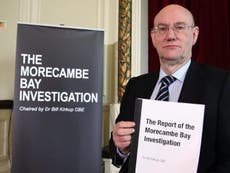The Independent's journalism is supported by our readers. When you purchase through links on our site, we may earn commission.
The Shrewsbury scandal proves what women tell me every day – NHS maternity care is in crisis
As many as one in three women in the UK are traumatised by their birth experiences, and one in 25 of those will go on to develop full-blown PTSD

The emerging maternity scandal in Shrewsbury and Telford is yet more evidence – as if it were needed – that, just as we have declared a “climate emergency”, we now need to declare a “birth emergency”, because maternity care is in crisis. We cannot continue to see scandals like Shrewsbury and Morecambe Bay as isolated, instead we must be brave enough to view them as symptomatic of a wider problem of a maternity system that has become completely dehumanised and unable to listen to women.
Overstretched and underfunded, with an ongoing shortage of midwives, the NHS is already struggling against the odds to provide gold quality care for women or the kind of positive working culture called for in the Kirkup Report. However, if we were to throw money at the problem, would this fix anything? A raft of new shiny machines to monitor labouring women won’t themselves prevent further failings. Instead we need to overhaul the entire maternity culture in the NHS, which is based on patriarchal ideas of female inadequacy and shows the same of lack of respect for women’s autonomy that we first saw exposed by the #Metoo movement.
Far too often, pregnant women in this country are still told that “doctor knows best”. A 2013 survey from UK charity Birthrights found that 24 per cent of women who had instrumental births in hospital did not consent to procedures, and an online survey by the Positive Birth Movement of more than 800 women who had been induced in the last five years found that 57 per cent reported they were not given a choice about being induced.
I often hear from midwives who are struggling to hold on to own their core values at work. A student midwife who recently got in touch with me spoke about how she sometimes feels like “a failure, a participant in trauma and abuse”, adding: “I know that working in this system there will come a time when I too contribute to disempowering women, preventing her choices and autonomy.”
Our conveyor belt care system means there is neither the time nor the cultural tendency to listen to women as individuals. “Risk”, for example, has become a label, applied as if by a stamping machine, with no sense of nuance. This leads us to a situation where some women (such as those with a higher body mass index) are declared “high risk” because of blanket set policies rather than their own personal experience of pregnancy, which then prevents them from accessing facilities such as birthing pools and midwife-led units which have in fact been proven to increase their chance of a safe, straightforward birth experience.
In the meantime, women who actually are at risk are not being properly listened to – as we saw in the leaked report, in which mother Rhiannon Davies was not flagged as “high risk” when she should have been.
Samantha French, an expectant mother from a different part of the UK, told me of how her first consultant simply “shrugged off” her autoimmune condition; it was only at a later appointment with a different doctor that she learnt she should have been having extra scans due to a much higher risk of stunted foetal growth.
Allie (who features in my book, Give Birth Like a Feminist) gave birth to her baby in Somerset in 2015. She described how her consultant was so angered by her desire to question his advice that he spent their entire consultation shouting at her, all the while failing to detect that her baby had stopped growing and was in grave danger. Luckily this was noticed at a different appointment a few days later, where she was told she was just hours from losing him. The first consultant, meanwhile, had referred Allie for psychiatric assessment.
Women like Allie and Samantha, who challenge the patriarchal maternity system, are portrayed as “mad” or “difficult” – especially if it is their first pregnancy.
Meanwhile, there is no consideration to the damage this “care” system can do to women themselves. As many as one in three women in the UK are traumatised by their birth experiences, and one in 25 of those will go on to develop full-blown PTSD after birth. Campaigns such as #FiveXmore are now calling for more attention to be given to the stats from the 2018 MBRRACE report (Mothers and Babies: Reducing Risk through Audits and Confidential Enquiries across the UK) showing that black women are five times more likely to die in the pregnancy and childbirth period than their white counterparts – a disparity that many feel can only be explained by systemic racism.
After the findings of this leaked interim report, there is now a danger that these very complex problems with maternity services will be ignored while midwifery and midwife-led maternity units will be vilified and expected to shoulder the blame for these failings.
As Bill Kirkup, who led the Morecombe Bay inquiry pointed out, the interim report from Shrewsbury echoes the same systemic failings seen elsewhere in NHS maternity services: a lack of communication and collaboration between professionals; a failure to investigate and learn from mistakes; an “institutional denial” of problems.
This is not about midwifery versus obstetrics. It’s not about natural versus medicalised birth. It would be a grave mistake to reduce it to that.
There are pockets of inspiration within NHS maternity services that are delivering stellar care – safe, personalised and woman-centred care through pregnancy and birth – against all odds. That is where to start now.
We need to bring human connection back into maternity services, as well as continuing to invest in the research and technology that can save the lives of those most at risk. But above all, we need to start listening to women. If we don’t do these things, history will only repeat itself.
Milli Hill is the founder of the Positive Birth Movement and the author of ‘Give Birth Like a Feminist’



Join our commenting forum
Join thought-provoking conversations, follow other Independent readers and see their replies